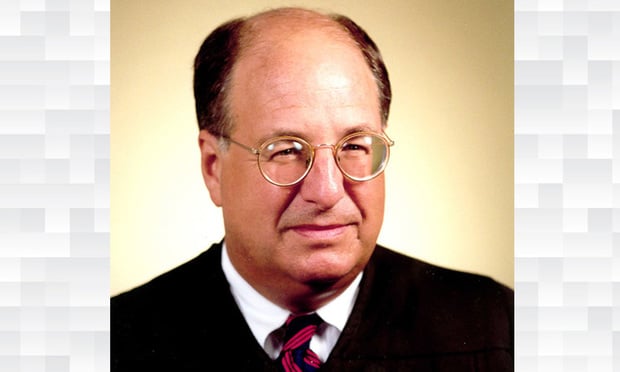Was the World's Biggest Hedge Fund Pursuing a Trade Secrets Case Against Former Employees in Bad Faith? It's a $2 Million Question
A series of filings in New York state court are are shedding some light on the often hush-hush world of hedge funds and the lengths that Bridgewater Advocates has gone to in attempts to keep former employees from using allegedly proprietary trading strategies to form competing funds.
July 21, 2020 at 07:30 AM
7 minute read
 Faith Gay, with Selendy & Gay.
Faith Gay, with Selendy & Gay.
Correction: An earlier version of this story mistakenly referred to Bridgewater Associates as Bridgewater Advocates.
A series of filings in New York state court are shedding some light on the often hush-hush world of hedge funds and the lengths that Bridgewater Associates, the world's largest hedge fund with $160 billion under management, has gone to in attempts to keep former employees from using allegedly proprietary trading strategies to form competing funds.
Lawyers at New York's Zeisler PLLC earlier this month filed a petition to confirm a panel decision from arbitrators at the American Arbitration Association in favor of two former Bridgewater employees, Lawrence Minicone and Zachary Squire. According to the panel decision, which has become public in subsequent court filings and captured the attention of the financial press, Minicone and Squire had both left Bridgewater back in 2013. After riding out the two-year non-compete provisions in their Bridgewater employment contracts with separate employers, the pair came back together to help found another fund called Tekmerion.
The new venture quickly caught Bridgewater's attention. Just two days after Tekmerion's founding, according to an email quoted in the panel decision, Bridgewater officials had gotten a copy of Tekmerion's pitch deck to investors and about a month later they were reaching out to their former employees to inquire about their trading strategy. After negotiations between the two funds went nowhere, Bridgewater with counsel from Wilmer Cutler Pickering Hale and Dorr filed a demand for arbitration in November 2017 claiming that the employees had violated Connecticut's trade secrets and unfair competition laws and failing to live up to the terms of their prior employment contracts. Bridgewater has since supplemented its legal team with trade secret expert James Pooley and a team from Selendy & Gay.
After two years of discovery and 18 days of evidentiary hearings, a three-arbitrator panel heard Bridgewater's claims over eight hearing days before the panel spread across last summer and fall in Wilmer's New York offices. In a final decision, rendered July 1, the panel majority not only found that Bridgewater hadn't shown that the strategies it accused Minicone and Squire of pilfering were actually protectable trade secrets, but went on to award the fund's former employees nearly $2 million in attorneys fees and costs finding that the fund had pursued its claims in bad faith.
One central finding by the majority, was that if Bridgwater had evidence of its former employees stealing trade secrets, they hadn't come forward with it. "As is widely-recognized, Bridgewater's offices are extremely secure facilities, requiring employees such as Squire and Minicone to place their cell-phones into signal-proof lockers upon entry, recording all employee movements by video, recording phone calls and internet communication, logging all computer access, requiring any files or attachments sent externally via email to be explicitly approved on a case-by-case basis, and maintaining restricted zones within Bridgewater's offices," the panel majority wrote. "In short, if Squire or Minicone had actually 'misappropriated' any trade secrets, Bridgewater would have evidence of it."
The panel majority also found that despite the detailed protective order in effect for the case, Bridgewater "never produced documents providing the degree of specificity that was required to define the trade secrets allegedly misappropriated."
What they did produce, according to the panel majority, were expert reports that relied on Bridgewater's counsel at Wilmer to reach "factual" conclusions. In particular, the panel majority cites a "withering" cross examination of expert Lawrence Leibowitz, where Zeisler name partner Aaron Zeisler asked if the expert had cut and pasted materials produced by Wilmer. According to the decision, Leibowitz responded, "Absolutely not." Zeisler then pointed out Leibowitz's report had a section titled "Background: Relevant Law and Facts" that was identical to a section in a report by another Bridgewater expert.
Ouch.
Wilmer's Robert Gunther Jr., according to the panel decision, interjected at the time to say that his firm provided the legal sections for the experts to apply. The panel majority, however, found that Bridgewaters's "experts relied on [Bridgewater's] outside counsel to reach at least some 'factual' conclusions on the basis of law and facts provided by" Wilmer, some of which were not supported by the evidence.
Gunther, in a phone interview Monday, said that the panel majority's conclusion about the identical paragraphs in the two expert reports was "flat wrong" and that the sections included direct citations to deposition testimony outlining the underlying facts. As part of his back up, Gunther pointed to the conclusion of the third member of the AAA panel, Thomas Brewer, who in his partial dissent from the AAA panel majority wrote that "it is routine for counsel presenting an expert witness to instruct the witness to make specified factual and/or legal assumptions provided by counsel in order to set the context for the witness to offer his or her opinion evidence." Brewer wrote that nothing about what happened in with Bridewater's experts warranted the majority's conclusion that their neutrality had been "undermined."
Now does all this add up to bad faith?
Zeisler says that in his experience representing small funds, "the overhang of a pending litigation alleging theft of trade secrets or intellectual property—which must be disclosed to prospective investors in due diligence—hampers efforts to attract capital."
He pointed out that the final AAA award found that Bridgewater "pursued the arbitration knowing that applicable securities rules and regulations would require [Tekmerion] to disclose the pending dispute to prospective investors, and that such disclosure was likely to make prospective investors more wary of investing in the new competitor's fund."
According to a team at Selendy & Gay led by name partner Faith Gay now representing Bridgewater in opposing the fee award, there was clearly no bad faith. Gay, who clarifed that her client is challenging just the attorneys fee award despite the fact Bridgewater "strongly disagrees" with the panel majority's fact-finding, called the attorney fee decision an "extreme result."
Bridgewater's lawyers quoted liberally in their filing from Brewer's partial dissent. Brewer concluded that his colleagues on the panel, Micalyn Harris and William Mentlik, failed to make "a reasonable allowance" for Bridgewater's desire to prosecute its claims based on plain English descriptions of the underlying concepts in hopes to prevent disclosure of sensitive evidence such as source code. "The majority ascribes bad motives to conduct that more likely was animated by caution and a desire to be careful to avoid further perceived breaches of valuable trade secrets and intellectual property while the case was in progress," wrote Brewer, who agreed with the panel's conclusion on Bridgewater's trade secrets claims, but on the narrower grounds that the fund hadn't established that there'd been any misappropriation.
Gay and company summed up Bridgewater's conundrum this way: "Prosecuting trade secret claims while maintaining those secrets' confidentiality is notoriously difficult."
This content has been archived. It is available through our partners, LexisNexis® and Bloomberg Law.
To view this content, please continue to their sites.
Not a Lexis Subscriber?
Subscribe Now
Not a Bloomberg Law Subscriber?
Subscribe Now
NOT FOR REPRINT
© 2025 ALM Global, LLC, All Rights Reserved. Request academic re-use from www.copyright.com. All other uses, submit a request to [email protected]. For more information visit Asset & Logo Licensing.
You Might Like
View AllReport: Securities Class Action Filings Hit Records as Settlement Values Soar
3 minute read
Daily Dicta: Lucky Ducks: Greenberg Traurig and Mintz & Gold Beat SEC in Insider Trading Case

Judge in Case Over State Street Overbilling Is Considering Appointing New Class Counsel
6 minute readLaw Firms Mentioned
Trending Stories
Who Got The Work
J. Brugh Lower of Gibbons has entered an appearance for industrial equipment supplier Devco Corporation in a pending trademark infringement lawsuit. The suit, accusing the defendant of selling knock-off Graco products, was filed Dec. 18 in New Jersey District Court by Rivkin Radler on behalf of Graco Inc. and Graco Minnesota. The case, assigned to U.S. District Judge Zahid N. Quraishi, is 3:24-cv-11294, Graco Inc. et al v. Devco Corporation.
Who Got The Work
Rebecca Maller-Stein and Kent A. Yalowitz of Arnold & Porter Kaye Scholer have entered their appearances for Hanaco Venture Capital and its executives, Lior Prosor and David Frankel, in a pending securities lawsuit. The action, filed on Dec. 24 in New York Southern District Court by Zell, Aron & Co. on behalf of Goldeneye Advisors, accuses the defendants of negligently and fraudulently managing the plaintiff's $1 million investment. The case, assigned to U.S. District Judge Vernon S. Broderick, is 1:24-cv-09918, Goldeneye Advisors, LLC v. Hanaco Venture Capital, Ltd. et al.
Who Got The Work
Attorneys from A&O Shearman has stepped in as defense counsel for Toronto-Dominion Bank and other defendants in a pending securities class action. The suit, filed Dec. 11 in New York Southern District Court by Bleichmar Fonti & Auld, accuses the defendants of concealing the bank's 'pervasive' deficiencies in regards to its compliance with the Bank Secrecy Act and the quality of its anti-money laundering controls. The case, assigned to U.S. District Judge Arun Subramanian, is 1:24-cv-09445, Gonzalez v. The Toronto-Dominion Bank et al.
Who Got The Work
Crown Castle International, a Pennsylvania company providing shared communications infrastructure, has turned to Luke D. Wolf of Gordon Rees Scully Mansukhani to fend off a pending breach-of-contract lawsuit. The court action, filed Nov. 25 in Michigan Eastern District Court by Hooper Hathaway PC on behalf of The Town Residences LLC, accuses Crown Castle of failing to transfer approximately $30,000 in utility payments from T-Mobile in breach of a roof-top lease and assignment agreement. The case, assigned to U.S. District Judge Susan K. Declercq, is 2:24-cv-13131, The Town Residences LLC v. T-Mobile US, Inc. et al.
Who Got The Work
Wilfred P. Coronato and Daniel M. Schwartz of McCarter & English have stepped in as defense counsel to Electrolux Home Products Inc. in a pending product liability lawsuit. The court action, filed Nov. 26 in New York Eastern District Court by Poulos Lopiccolo PC and Nagel Rice LLP on behalf of David Stern, alleges that the defendant's refrigerators’ drawers and shelving repeatedly break and fall apart within months after purchase. The case, assigned to U.S. District Judge Joan M. Azrack, is 2:24-cv-08204, Stern v. Electrolux Home Products, Inc.
Featured Firms
Law Offices of Gary Martin Hays & Associates, P.C.
(470) 294-1674
Law Offices of Mark E. Salomone
(857) 444-6468
Smith & Hassler
(713) 739-1250







